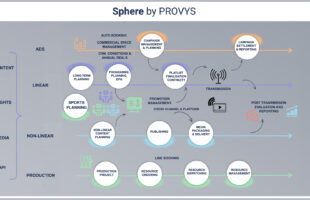THE Mass Communications Organization of Thailand (MCOT) Channel 9’s new direction sees a move back to entertainment programming, after efforts over recent years to promote news and documentaries. Wasan Paileeklee, MCOT’s president, is confident regarding the trend. “For MCOT we are targeting about 15 percent growth and we are confident that we should be better than the overall industry in terms of competitiveness,” Wasan told Television Asia Plus. Channel 9 – better known by its brand name Modernine – is aiming to hold a firm third in the local TV station rankings led by Bangkok Broadcasting and TV’s (BBTV) Channel 7, BEC World’s Channel 3 – while MCOT holds the operating license and the Royal Thai Army’s RTA Channel 5. “We believe we are doing better and better since we revamped the TV program line-up last year as well as gaining audience share, more utilization and more income,” he said. This year the trend is going to continue. A reorganization of programming in the second half of the year is expected to strengthen the station’s position “in terms of rating and also in terms of revenue generation.” The boost for local broadcasters came with the shift in status of former rival Thailand Independent Thai TV (TITV), itself transformed from commercial station Independent TV (iTV) – previously controlled by Shin Corp owned by former prime minister, Thaksin Shinawatra. The military-appointed government moved to change TITV’s status as a commercial broadcaster into that of being publicly funded and is now known as Thailand Public Broadcasting Service (Thai PBS). After TITV ceased operations at the start of 2008, advertising spending shifted to several other broadcasters including Channel 3 and Channel 7 as well as Modernine. Programme houses also moved to find new outlets. “What we can say is that we have much better market share,” he said. Modernine’s share has increased to 18.4 percent from 12.1 percent at the start of 2007. The programme revamp this year will mark a further shift back to entertainment while still maintaining a firm foothold in news and documentaries. In the past, Modernine’s share of entertainment programming stood at about 24 percent, but with the shift this will increase to 32 percent. In the mix, however, news broadcasting will increase to about 40 percent from the current level of 32 percent. Wasan, a former journalist with the British Broadcasting Corp (BBC) before returning to Thailand, thinks that accuracy and professionalism in news broadcasting will hopefully lift the station to number one as the choice for viewers for news. But Wasan is not afraid of being ambitious in other programme categories. European football has been favoured including broadcasting of the German and Spanish leagues but it does not stop there. “We would like to be the No 1 cartoon provider, and in terms of documentary we rank quite highly,” he said. But he is willing to concede ground in documentary broadcasts that generally offer low revenue returns. This is an area in which he expects Thai PBS will take a greater role. But he is also aware the industry needs to brace for change that lies on the horizon. A recently passed new broadcasting law in Thailand will eventually lead to more entrants into the broadcast sector. The new laws also opened the way for satellite and cable TV operators to carry advertising, marking a change from previous restrictions. “With the new laws in the future there will be more new players for free TV, probably ‘dozens’ of TV channels,” he said. So we need to prepare ourselves for that competition. We have to make ourselves stronger and stronger in terms of content and in terms of business.” And while satellite and cable TV will draw some advertising revenue away from the free to air TV stations, Wasan believes the trend will be slow to start, giving existing players time to adapt. What lies on the horizon will be the impact of new technology. The main driver will come from digital broadcasting technology leading to significant shifts throughout the industry, with increased numbers of broadcast frequencies. Thailand is still to decide on the digital technology format but debate is centered on Digital Video Broadcasting (DVB) following the European model and in keeping with other Asian broadcasters. “Modernine TV is going to be a content provider so we need to be strong in terms of content because in the future I believe that content will be king,” Wasan said. “The medium or the channel to broadcast will be less and less important – the content will be more important,” he said. In 2007, MCOT reached an agreement with South Korean telecom operator, SK Telecom, to test digital mobile-TV broadcasting for the first time in Thailand. Wasan hopes Modernine may claim 10 percent of the 40 million Thai mobile phone users within the next two to three years. The technology used is the Digital Video Broadcasting – Handheld (DVB-H) and Digital Video Broadcasting – Terrestrial (DVB-T). The expansion is likely to see more foreign investor interest in the Thai broadcast industry, he believes. But this trend will also be guided. The new broadcast industry law allows for foreign holdings of less than 25 percent in the media business, although for telecommunications this was raised to about 49 percent in 2006. “I think it’s probably not going to happen for a few years yet,” when foreigners actively take up key investment positions in Thai broadcast media companies. Wasan has set both MCOT and Modernine on new trajectories. The respected former journalist has Modernine heading along a strong growth path but will be willing to change gears in the challenging times ahead for the Thai broadcast industry.
Ad – Before Content
Related Articles
ZEE5 Global and Jio Studios unite to bring blockbusters Hisaab Barabar and Mrs. to OTT Screens
- Latest Movies and Series Premiering on MAX this January
An unrivalled and highly elusive lone assassin, the Jackal, (Eddie Redmayne) makes his living carrying out hits for the highest fee. But following his latest kill, he meets his match in a tenacious British intelligence officer (Lashana Lynch) who starts to track down the Jackal in a thrilling cat-and-mouse chase across Europe, leaving destruction in its wake.
Keshet International sells Tuesday’s Child TV’s The Hit List to M6 Groupe in France
Glensound Debuts European Parliamentary Broadcast System at ISE 2025
- PROVYS Technologies Reports an Active and Successful 2024
Screenshot
ZEE5 Global announces the World Digital Premiere of The Sabarmati Report








